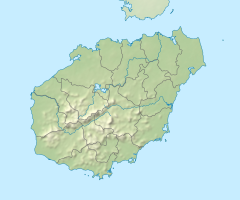The Zhubi River (Chinese: 珠碧江), also known as Zhubi Jiang,[4] is a river in the west of Hainan Island of China. Its source section is called Heshui River (合水河). The river originates in Nangao Ridge (南高岭)[5] in the middle of Baisha Li Autonomous County,[6] flows through Changjiang County,[7] and finally merges into Gulf of Tonkin at Haitou Port (海头港).[8]
| Zhubi River | |
|---|---|
| Native name | 珠碧江 (Chinese)[2] |
| Location | |
| Country | Hainan, China |
| County | Baisha Li Autonomous County[1] |
| Physical characteristics | |
| Mouth | |
• coordinates | 19°30′37″N 108°56′01″E / 19.5103°N 108.9336°E |
| Length | 84 kilometers[3] |
Zhubi River is 84 kilometers long, with a watershed area of 657.7 square kilometers[9] and an average annual runoff of 640 million cubic meters. It is one of the three major rivers in Hainan.[10] In the middle reaches of the river, the Bangxi Provincial Nature Reserve (邦溪省级自然保护区) has been established to protect the rare species of Hainan Eld's deer (海南坡鹿).[11]
References
edit- ^ "Rural tourism becomes a hot spot in Baisha". Hainan Daily. 2016-05-25.
- ^ Hainan Statistical Yearbook. China Statistics Press. 2013. ISBN 978-7-5037-6816-3.
- ^ Changjiang County History. Xinhua Publishing House. 1998. ISBN 978-7-5011-4066-4.
- ^ Chinese Dictionary of Water Names. Harbin Cartographic Publishing House. 1995.
- ^ "Hainan develops characteristic eel breeding industry". Hainan Daily. 2019-12-23.
- ^ "Exhibition hall of Baisha Li Autonomous County". Xinhua News Agency. 2019-09-03. Archived from the original on 2020-08-09.
- ^ "Construction project environmental impact report form" (PDF). Ministry of Ecology and Environment. 2019-02-13.
- ^ Cui Naifu (1998). The Great Dictionary of Place Names of the People's Republic of China. Commercial Press. pp. 6461–. ISBN 978-7-100-03253-7.
- ^ Manduertu; Lu Xun; Luo Xianyou (2002). Baisha County Li Nationality Volume. Publishing House of Minority Nationalities. pp. 5–. ISBN 978-7-105-05144-1.
- ^ "Walk into this unpopular tourist town". International Daily News. 2018-07-31.
- ^ Compilation Committee of Chinese Dictionary of Rivers and Lakes (January 2013). Chinese Dictionary of Rivers and Lakes·Pearl River Volume. Beijing: China Water & Power Press. pp. 458–. ISBN 978-7-5170-0561-2.
